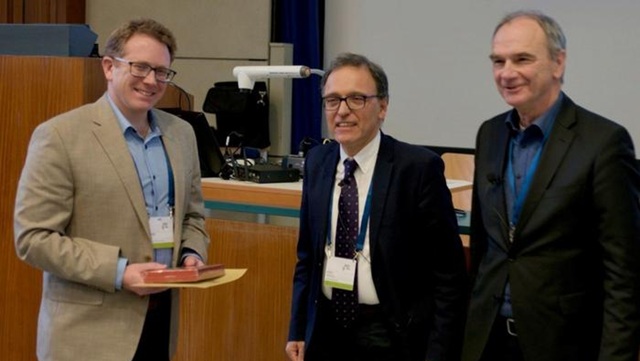Dr. Ben Jones, an associate professor of physics at the University of Texas at Arlington, has been internationally recognized for his contributions to advanced instrumentation in particle physics research using neutrinos.
Jones was awarded the 2025 International Committee for Future Accelerators (ICFA) Early Career Researcher Instrumentation Award. Presented by the ICFA Instrumentation Innovation and Development Panel, this prestigious honor acknowledges his significant advancements in developing cutting-edge tools for future accelerator experiments. His work plays a crucial role in pushing the boundaries of particle physics and experimental research.
Jones serves as associate director of the UTA Center for High Energy and Nuclear Physics and co-director of the UTA Center for Advanced Detector Technology. His research group, Neutrinos and Rare Event Searches, is at the forefront of neutrino physics, leveraging tools from nuclear physics, ionic and atomic beams, super-resolution microscopy, quantum computing, materials science, machine learning and other fields to uncover previously unknown neutrinos.
“Our goal at the Center for Advanced Detector Technologies is to realize transformative new detection methods using techniques from beyond the traditional boundaries of particle and nuclear physics,” Jones said. “I am honored to be recognized by ICFA for leading this research.”
Neutrinos are truly fascinating and elusive particles. Neutrinos are elementary subatomic particles, meaning they are among the most basic building blocks of the universe. They belong to a group of particles called leptons.
They are often called “ghost particles” because they interact very weakly with other matter. This means they can pass through vast amounts of solid material, even the Earth, almost without any interaction.
Due to their weak interactions, neutrinos are incredibly difficult to detect. Scientists use large and sophisticated detectors, often located deep underground or in ice, to study them. In recent times, there have been exciting discoveries regarding very high energy neutrinos, which gives scientist more data to try and understand the universe.
“I also want to highlight the crucial efforts of talented UTA graduate students and undergraduate researchers, whose commitment to this work has enabled these advances,” Jones said. “I consider this award to be a recognition of the achievements of the whole team.”
Jones’ current research focuses on uncovering the origin of neutrino mass. As part of the NEXT program (Neutrino Experiment with a Xenon TPC), his team applies fluorescence microscopy, a technique they recently published in Nature Communications. He is also involved in the production and optical characterization of cold atomic tritium sources for the Project 8 experiment, which aims to measure the neutrino’s mass. This work was recently published on arXiv. Both projects are supported by the U.S. Department of Energy’s Nuclear Physics sub-program.
“This is a tremendous and well-deserved honor for Dr. Jones,” said Alex Weiss, professor and chair of the UTA Department of Physics. “He’s doing very important research, assisted by graduate and undergraduate students for whom he serves as an excellent mentor. It’s work that could lead to important discoveries and could enhance our understanding of the origins of the universe.”




